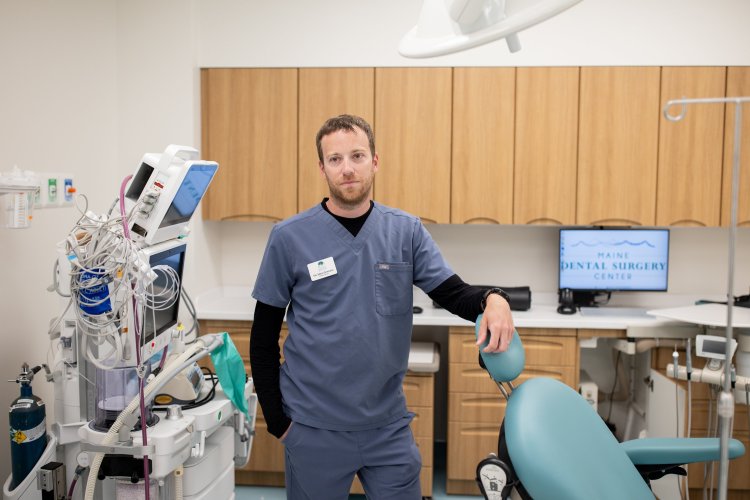
Millie Eller needed to have a few cavities filled, but because the now-7-year-old would flinch and wiggle around so much, her dentist knew she couldn’t be awake for the procedure.
However, the wait time to give the Hartford girl anesthesia so she could be treated was several months.
The Eller family’s situation is one example of what dentists in Maine say is an unacceptable and increasingly common statewide problem — months-long delays to treat children on MaineCare who have dental issues that require general anesthesia, in part because of low reimbursement rates from the state health and human services department.
Dentists say they have to limit the number of patients given general anesthesia at any given time because they are losing too much money, paying anesthesiologists out of their own pockets to make up for the shortfall caused by low reimbursements.
Michael Dowling, a Yarmouth pediatric dentist, said under current reimbursement rates, which cover only a portion of the cost of general anesthesia, dentists lose hundreds of dollars for every hour that a child is put under.
“Nowhere else in our health care system do we say to patients in such urgent need, ‘You have to wait a year or more to get that fixed,’” said Dowling, who accepts MaineCare, which is the state’s name for Medicaid. “But somehow this is allowed where we have kids with a mouthful of cavities waiting months in pain and we can’t do anything about it.
“This is not acceptable.”
Lindsay Hammes, a spokesperson for the Maine Department of Health and Human Services, said in a statement that all dental reimbursement rates — for children and adults — will go up 1% with the state’s cost-of-living adjustment in September.
She said DHHS is aware of dental access problems and is moving up its rate reform process, which determines whether changes need to be made, by one year. DHHS evaluates its rates every five years, but in the case of dental rates, the reform is being done after four years and will occur in 2026, she said.
Details about possible rate changes are not yet available.
Hammes said workforce shortages are also causing access problems in dental care.
“The department has identified challenges in the workforce as one of the largest contributing factors for wait lists,” Hammes said.
It’s unclear how many children on MaineCare are facing long delays for dental treatment because they need general anesthesia. That data is not tracked, according to the Maine Dental Association, but it’s estimated to be thousands of children per year.
Therese Cahill, the association’s executive director, said that based on conversations with dentists across the state, the problem is acute.
“It is a ridiculous situation,” Cahill said, “and it’s getting way worse.”
‘TERRIBLE TO HAVE TO TELL PARENTS THIS’

It took three months for Sarah Eller’s daughter, Millie, to get an appointment to have her cavities filled in 2024, after initially being told it would take five months.
Eller’s son, Jonah, now 4, also had a delay last year in getting his two front teeth capped because of a type of decay caused by frequent exposure to sugary liquids.
Jonah was in mild pain, Eller said, and she gave him over-the-counter painkillers while waiting six months to get him in with Dowling, the children’s dentist, for surgery that required general anesthesia.
Dowling said there’s an easy fix — increasing the reimbursement rate. The Maine Dental Association estimates it would cost the state a few hundred thousand dollars per year to increase the reimbursement rate for general anesthesia for dental work.
MaineCare rates can be increased by the state health department or the Legislature can mandate increases if a bill is signed into law.
Dowling said reimbursement rates are so low that dentists lose about $300 to $400 for every hour that a child is put under. According to Dowling, it costs $900 to $1,000 per hour to administer general anesthesia to a child for dental work, while the dentists get reimbursed $600 per hour.
This often leaves dentists with few options: delay procedures or pay the anesthesiologists the difference and take the financial hit.
No matter what, dentists have to limit the number of oral surgeries to reduce losses, according to the Maine Dental Association.
Cahill, the association’s executive director, said some dentists are unwilling to accept MaineCare patients due to the low reimbursement rates.
Dowling said the Maine DHHS has so far been unresponsive to his requests to boost the reimbursement rate, even after he met with DHHS officials. And a legislative attempt this year to fix the problem failed to even make it to a floor vote.
While increasing the rates won’t solve the entire problem, it will ease one massive bottleneck in the system, Dowling said.
The current system, he said, isn’t working for patients.
“Moms will call us and say, ‘My 3-year-old is crying in pain every night,’ and we have to tell them we can’t get them in for several months,” Dowling said. “It’s heartbreaking.”
Dowling said he recently spent more than $2 million for a new surgery center at his Yarmouth practice that is set to open in September. He said it will be underutilized unless the rates improve, even though he’s willing to absorb some financial losses to provide the service.
Cahill said that while Dowling is willing to absorb some losses, other dentists “understandably” won’t.
Whitney Wignall, a Portland pediatric dentist, said her current wait list is about nine months for MaineCare pediatric patients who need general anesthesia.
“It’s terrible to have to tell parents this,” Wignall said. “You feel horrible as a person. You have children with an infection and know they have to wait while they have this infection in their mouth. It’s not a safe nor a good or ethical way to practice.”
LOW RATES, LESS ACCESS TO DENTAL CARE
Republican Rep. Lucien Daigle, a retired dentist from Fort Kent, said the overall MaineCare rates for dentists are too low and are restricting access to children and adults on Medicaid. But a bill this year supported by Daigle that would have improved the overall rates never gained traction in the Legislature.
Daigle said that, in the meantime, the state should fix the rates for general anesthesia for dentistry for patients of all ages, even though that’s a narrower issue.
“The Mills administration and the whole Democratic Party unfortunately is not willing to pony up,” Daigle said. “We talk a lot about how much we care, but we need to step up to the plate and do something about it.”
A spokesperson for Gov. Janet Mills did not respond to a request for comment.
Maine ended 2025 with a $152 million budget surplus, so Dowling said a small portion of that could go for improved reimbursement rates.
Cahill said dentistry overall for Medicaid patients — both adult and pediatric — is in a crisis stage, with demand far outstripping availability.
Cahill said the reasons for limited access to dental care are many and go beyond the reimbursement rate for anesthesia, including workforce shortages, lack of oral surgeons and increased demand.
Hammes said another factor is some dentists are opting out of accepting any type of insurance, including MaineCare and private insurance, requiring patients to self-pay.
Dowling said if Maine can address oral health in a more timely way, it can prevent problems from becoming worse, saving emergency room visits and costing the system less in the long run.
Eller, the Hartford mom, said her daughter Millie possibly needs to have more extractions because her mouth is crowded and pulling some baby teeth may help her adult teeth come in straight. That could save expensive orthodontic work later.
But Eller said her daughter may have to wait a year or longer to get that work done.
Preventing dental problems by investing in the overall MaineCare system would create long-lasting societal benefits, Dowling said.
“The choices we make now for our 6-year-old and 10-year-old kids,” he said, “end up sticking with them the rest of their lives.”

We invite you to add your comments. We encourage a thoughtful exchange of ideas and information on this website. By joining the conversation, you are agreeing to our commenting policy and terms of use. More information is found on our FAQs. You can modify your screen name here.
Comments are managed by our staff during regular business hours Monday through Friday as well as limited hours on Saturday and Sunday. Comments held for moderation outside of those hours may take longer to approve.
Join the Conversation
Please sign into your CentralMaine.com account to participate in conversations below. If you do not have an account, you can register or subscribe. Questions? Please see our FAQs.